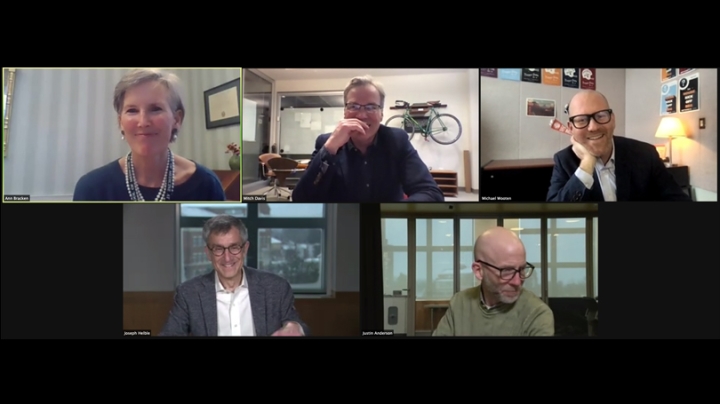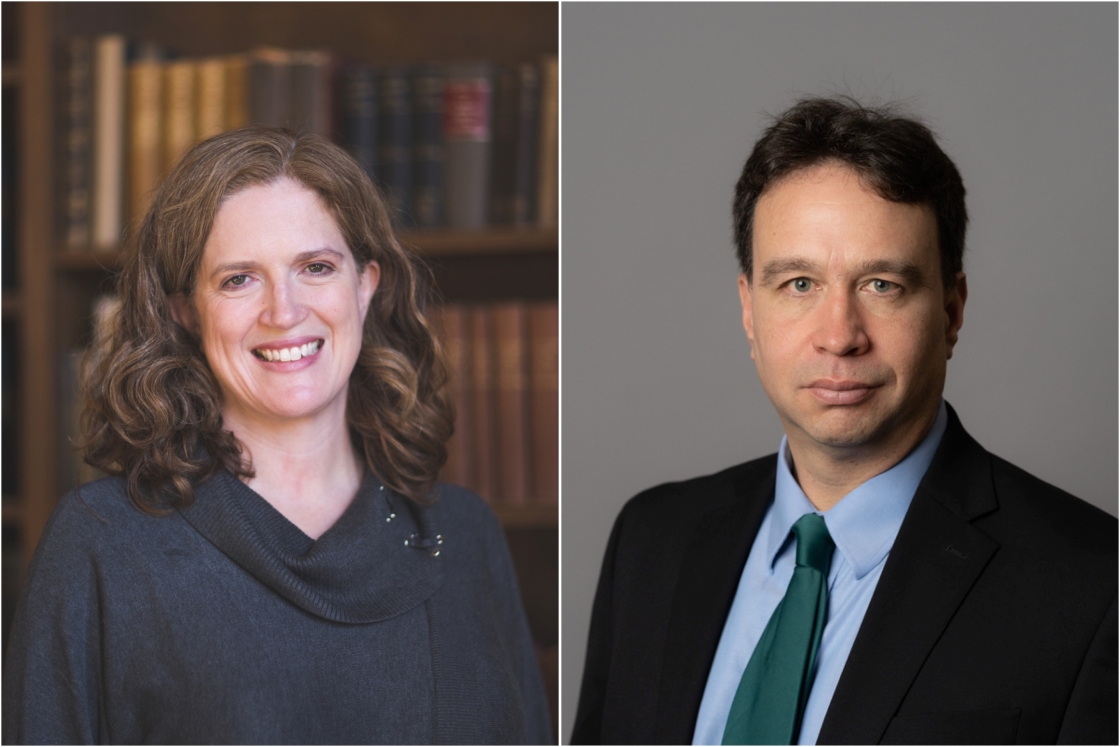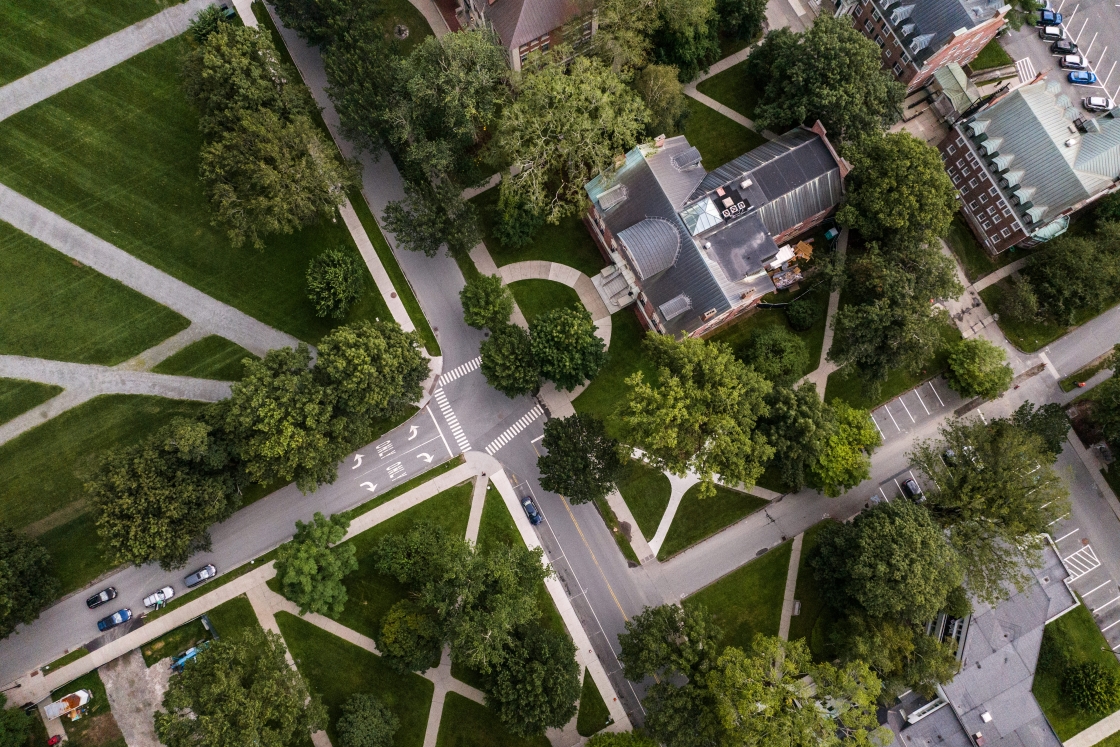The winter term is off to a “fairly uneventful start—which is exactly what we hoped to see,” Provost Joseph Helble told viewers during this week’s Community Conversations webcast (which aired on Thursday this week instead of its regular Wednesday time due to the U.S. presidential inauguration).
About half of all undergraduates are in residence this term, arriving in Hanover this past weekend. The returning students are in the process of completing their required quarantine period while continuing their remote classes, now in their third week. They and their classmates, who are not on campus and are also learning remotely, are enrolled in a total of 868 course sections—“exactly the number offered in last year’s pre-pandemic winter term,” Helble said. Classes are also underway for graduate and professional students.
And while Dartmouth leadership continues “monitoring campus and local conditions and trends constantly, and there is, of course, no guarantee that conditions will not change over the course of the winter term,” Helble stressed that a move to more restrictive conditions is not imminent, noting that steady or declining COVID-19 trends at the local and state levels over the past week give reason for cautious optimism.
Dartmouth’s COVID-19 positivity rate is currently 0.22%, a number that has held steady for the past two weeks. Grafton County, where Hanover is located, has a slightly higher positivity rate, at 1.1%, but “remains the lowest level of any county in the state of New Hampshire,” Helble said.
Because of these trends, the campus is currently on track to expand winter activities for students, indoors and out, beginning on Tuesday, when most undergraduates will have completed their quarantine, he said.
The activities include skating at two rinks on the Green, complete with Adirondack chairs and fire pits around the perimeter; cross-country skiing and sledding at the former Hanover country club; and alpine skiing at Dartmouth Skiway. In addition, indoor facilities such as Collis Center, Baker-Berry Library, Alumni Gym, Kemeny and Haldeman Halls, the Class of 1978 Life Sciences Center, and the Top of the Hop will be available to students into the evening.
Details about these and other opportunities are available on engage.dartmouth.edu and the Office of Student Life websites. Helble encouraged students, parents, and the greater Dartmouth community to continue sending suggestions for winter term activities to WinterTermSuggestions2021@Dartmouth.edu.
Beginning on Monday, mandatory twice weekly COVID-19 testing for students, faculty, and staff working or taking classes on campus will move from Leverone Field House to Thompson Arena.
Joining Helble over Zoom this week were Ann Bracken, a physician and director of clinical medical services at Dartmouth College Health Service; Mitchel Davis, vice president and chief information officer; and Michael Wooten, associate dean of residential life and director of residential education. They answered viewer questions in a conversation moderated by Vice President of Communications Justin Anderson.
Bracken explained the services available at Dick’s House, the health service headquarters, and noted that the telehealth services her team has adopted due to the pandemic will likely continue when campus life returns to normal. She said Dartmouth is coordinating with state and local officials to make sure students will have access to vaccinations as they become available.
Wooten echoed Helble’s assessment that the start of winter term held not many surprises as students returned. “It is wonderful to have students back,” he said. “Students are the reason that we do what we do—whether it’s in the classroom or in the residence halls or all the opportunities on campus.”
Asked if he had any advice for students and others suffering from Zoom fatigue, Davis—who leads Information, Technology, and Consulting (ITC), which has overseen the pandemic-driven shift to remote learning—said he tries to keep his meetings short so that he can take breaks from the computer in between.
ITC is helping to shift the attitude to remote learning from “talking about how are you going to help people survive” to “how are you going to help people thrive,” Davis said. “Our approach has always been, not to just help people get by, but to do something exceptional with where we are.” He said that some faculty are innovating their remote teaching methods, using other kinds of technology, such as virtual-reality systems.
Looking ahead, Helble said he believes spring term operations will look very similar to winter and fall. Students planning to be on campus in the spring will start receiving information soon. He also anticipated an announcement about commencement and alumni reunions before the beginning of spring term, noting that “it remains unlikely, unfortunately, that we will be in a position to hold the normal tightly packed ceremony on the Green—but no decisions have been made.”
Helble concluded by thanking members of the community for their commitment to safety measures such as mask-wearing, physical distancing, testing, and hygiene.
“We have a community that throughout has embraced the measures that we need to keep the campus and the surrounding community safe,” he said. “Your effort has been extraordinary, and if we can continue down this path, I am confident that we will have a successful term that will lead us into an even more successful spring term.”
Community Conversations is a live production of Dartmouth’s Media Production Group and the Office of Communications that airs on selected Wednesdays at 3:30 p.m. The next webcast is scheduled for Feb. 3.
For the most recent information on Dartmouth’s response to the pandemic, visit the Dartmouth Together COVID-19 website.
Hannah Silverstein can be reached at hannah.silverstein@dartmouth.edu.


